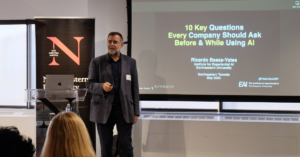Demystifying Responsible AI: From Concept to Deployment, Essential Questions Explored

In the rapidly evolving realm of artificial intelligence (AI), ensuring responsible development and deployment practices has become paramount. As the capabilities of AI continue to expand, so too does the need for ethical considerations and responsible governance. However, despite the growing awareness of these issues, many companies still struggle with implementing comprehensive strategies to address them.
To shed light on this critical topic, Northeastern University in Toronto hosted a presentation from Dr. Ricardo Baeza-Yates, Director of Research at the Institute for Experiential AI of Northeastern University which covered the key questions surrounding the development of responsible AI products. Drawing from the ACM Principles for Responsible Algorithmic Systems (2022), where he is one of the main two authors, and their extensions for Generative AI (2023), the event aimed to provide insights into the entire process, from conception to deployment. Attendees were guided through an exploration of the relevance, challenges, and potential solutions associated with each key question.
The presentation kicked off by emphasizing the importance of responsible AI development in today’s digital landscape. As AI technologies become increasingly integrated into various aspects of society, ensuring that they adhere to ethical principles is essential to mitigate potential risks and promote positive outcomes. Dr. Baeza-Yates cautioned against the blind adoption of AI without due regard for its potential consequences. Drawing parallels to historical debates surrounding technology and ethics, he prompted attendees to critically examine their perspectives on AI.
“Ethical AI doesn’t exist, [but AI ethics exists]. Ethics is something human and we shouldn’t assign human traits to machines.”
One of the fundamental questions addressed in the presentation was how to incorporate ethical considerations into the design phase of AI products. This involves not only identifying potential biases and ethical implications but also integrating mechanisms for transparency and accountability from the outset.
Dr. Baeza-Yates also emphasized the importance of governance in AI, highlighting the need for responsible high governance in place within companies. He noted that most companies lack responsible high governance but mentioned efforts to address this through courses and initiatives aimed at educating professionals about responsible AI practices. Dr. Baeza-Yates stressed the significance of having systems in place for contestability, auditability, and accountability, underscoring the necessity of tracking decision-making processes within organizations.
“Data doesn’t capture everything, for example, data doesn’t capture the whole context of justice.”
One of the key takeaways from the event was the recognition that responsible AI development requires a multifaceted approach. It’s not enough to simply adhere to a set of principles; companies must actively incorporate ethical considerations into every stage of the development process, from ideation to deployment. Ongoing evaluation and refinement of AI systems is paramount to ensure that they continue to align with ethical standards and societal values. This iterative approach enables companies to adapt to changing circumstances and address new challenges as they arise.
We’d like to thank Dr. Ricardo Baeza-Yates for this thought-provoking presentation which provided valuable insights into the key questions surrounding the development of responsible AI products. As the field of AI continues to evolve, initiatives like this are crucial for promoting responsible practices and ensuring that AI technologies are used to benefit society. By fostering collaboration and dialogue, we can work towards a future where AI is developed and deployed responsibly, ethically, and in the service of humanity. You can learn more about the work being done by the Institute for Experiential AI of Northeastern University here.
 About the Presenter:
About the Presenter:
Dr. Ricardo Baeza-Yates is Director of Research at the Institute for Experiential AI of Northeastern University. Before he was VP of Research at Yahoo Labs from 2006 to 2016, based first in Barcelona, Spain, and later in Sunnyvale, California. He obtained a Ph.D. in CS from the University of Waterloo, Canada, in 1989. He is the co-author of the best-seller Modern Information Retrieval textbook published by Addison-Wesley, 2011 (2ed), that won the ASIST 2012 Book of the Year award. In 2009 he was elevated to ACM Fellow and in 2011 to IEEE Fellow. He actively participates as an expert in many global initiatives, committees, and advisory boards related to Responsible AI.





